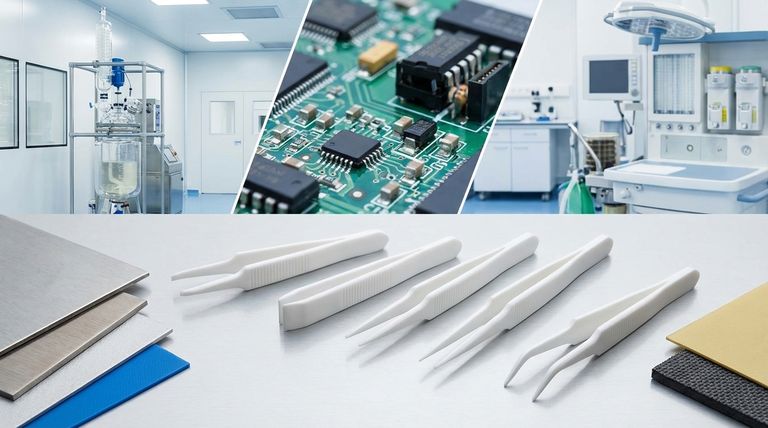In short, Teflon is used in nearly every demanding industry. Its unique properties make it a critical material in sectors ranging from chemical processing, aerospace, and medical manufacturing to electronics, food production, and oil and gas exploration.
The core reason for Teflon's widespread adoption is not just one single attribute, but its rare combination of three key properties: extreme chemical inertness, a very low coefficient of friction, and stability across a wide range of temperatures. This trifecta makes it an essential problem-solving material in environments where most other materials would fail.

Why Teflon is the Go-To Material in Demanding Sectors
Teflon, or Polytetrafluoroethylene (PTFE), is not just one material but a family of fluoropolymers. Understanding its core benefits explains its presence in so many critical applications. Its value comes from its ability to perform reliably under extreme conditions.
Chemical and Pharmaceutical Processing: Unmatched Inertness
The single most important property for this sector is Teflon's chemical resistance. It is virtually inert and does not react with the vast majority of industrial chemicals.
This makes it indispensable for lining reactors, pipes, valves, and pumps. It prevents corrosion and ensures the purity of the product, which is non-negotiable in pharmaceutical and fine chemical manufacturing.
Aerospace and Automotive: Stability Under Stress
In aerospace and automotive engineering, components must withstand extreme temperatures and friction. Teflon is used for seals, gaskets, and coatings on engine parts.
Its high-temperature stability ensures that seals do not degrade, while its low-friction surface reduces wear and tear on moving components, improving efficiency and reliability.
Medical and Food Manufacturing: Purity and Safety
Teflon is biocompatible and meets stringent safety standards, making it safe for contact with food and for use inside the human body.
Its famous non-stick surface prevents contamination and makes cleaning equipment easier in food processing. In the medical field, it's used for implants, surgical tools, and critical tubing.
Electronics and Semiconductors: Superior Insulation
Teflon is an excellent electrical insulator. This property is crucial in high-performance electronics and semiconductor manufacturing.
It is used to insulate high-frequency wires and cables and as a material for machined parts in semiconductor equipment, where electrical integrity is paramount.
Oil and Gas: Resisting Extreme Environments
The oil and gas industry operates in some of the harshest environments, dealing with high pressures, corrosive chemicals, and extreme temperatures.
Teflon's durability makes it ideal for O-rings, seals, and gland packing in wells, pipelines, and processing facilities, preventing leaks and equipment failure.
Understanding the Trade-offs
While incredibly versatile, Teflon is not the solution for every problem. An objective assessment requires understanding its limitations.
Relative Softness and Creep
Compared to metals or harder plastics, Teflon is a relatively soft material. It can be susceptible to "creep" (deforming under sustained pressure) and is not suitable for high-load structural applications without reinforcement.
Temperature Ceilings and Fumes
While it has excellent heat resistance, Teflon does have an upper limit. At very high temperatures (well above normal cooking or industrial use), it can begin to degrade and release fumes, which is a critical design consideration.
Fabrication and Cost
Machining or molding Teflon can be more complex than working with common plastics. Its unique properties require specialized techniques, which can influence the final cost of the component.
Making the Right Choice for Your Goal
To determine if Teflon is the appropriate choice, consider the primary challenge you need to solve.
- If your primary focus is chemical purity and non-reactivity: Teflon is an industry standard for lining vessels and creating seals in corrosive environments.
- If your primary focus is reducing friction in moving parts: Its exceptionally low friction coefficient makes it ideal for bearings, coatings, and anti-friction devices.
- If your primary focus is high-temperature electrical insulation: Teflon is a superior choice for wiring and components in demanding electronic or aerospace systems.
- If your primary focus is safety and compliance in food or medicine: Its non-toxic, non-stick, and biocompatible properties are essential for processing equipment and medical devices.
Ultimately, Teflon's value is defined by its ability to provide reliable performance where other materials cannot.
Summary Table:
| Industry | Key Teflon (PTFE) Applications | Primary Benefit |
|---|---|---|
| Chemical & Pharmaceutical | Reactor liners, seals, valves | Extreme chemical inertness, product purity |
| Medical & Food | Implants, surgical tools, processing equipment | Biocompatibility, non-stick surface, safety |
| Aerospace & Automotive | Engine seals, gaskets, coatings | High-temperature stability, low friction |
| Electronics & Semiconductors | Wire insulation, machined components | Superior electrical insulation |
| Oil & Gas | O-rings, gland packing, pipeline seals | Durability in harsh, corrosive environments |
Need high-performance PTFE components for your industry?
At KINTEK, we specialize in the precision manufacturing of PTFE seals, liners, labware, and custom components. Whether you're in the semiconductor, medical, laboratory, or industrial sector, we deliver solutions that leverage Teflon's unique properties to solve your most demanding challenges.
We offer custom fabrication from prototypes to high-volume orders, ensuring reliability where it matters most.
Contact our experts today to discuss your specific application and get a quote.
Visual Guide

Related Products
- Custom PTFE Parts Manufacturer for Teflon Parts and PTFE Tweezers
- Custom PTFE Parts Manufacturer for Teflon Containers and Components
- Customizable PTFE Rods for Advanced Industrial Applications
- Custom PTFE Teflon Balls for Advanced Industrial Applications
- Custom PTFE Square Trays for Industrial and Laboratory Use
People Also Ask
- What are the key advantages of PTFE? Unmatched Performance for Extreme Environments
- What tips can improve Teflon machining results? Master Sharp Tools, Heat Control, and Rigid Support
- What are the future considerations for machining Teflon? Mastering Material Challenges with Smart Tech
- Why is CNC machining preferred for Teflon parts over other methods? Unlock Precision & Complex Designs
- What industries use PTFE machined parts and for what applications? Critical Components for Demanding Environments



















